Social Media User Faces Execution In Iran For Criticism

A human rights group has reported that Iran’s judiciary has brought charges against a man that are punishable by death for posting negative comments about the regime.

A human rights group has reported that Iran’s judiciary has brought charges against a man that are punishable by death for posting negative comments about the regime.
Hengaw Organization for Human Rights said on Thursday that 39-year-old Ali Akbar Zaz has been accused of ‘Sab Al-Nabi’ or insulting the prophet and ‘Moharebeh’ or enmity against God. These are vaguely defined charges which carry a death sentence.
Zaz was arrested in June 2023 by security forces at his home in Tehran for criticizing the Islamic Republic on social media, according to Hengaw.
The human rights group also reported that Zaz has told his family on a telephone call that during his detention he has been subjected to torture and forced confessions.
The Islamic Republic has been ramping up execution practices since the anti-regime protests began last year after the death of Mahsa Amini. Arrested for not wearing her hijab properly, Amini was found to have been dealt severe blows to the head.
Iran executed protestors for taking part in the nationwide uprising which human rights groups called “horrifying” and “chilling”.
“These executions are designed by the Iranian authorities to send a strong message to the world and the people of Iran that they will stop at nothing to crush and punish dissent.”
“In the absence of a robust international response, the authorities will continue to revel, unabated, in their impunity with lethal consequences for people in Iran,” said Amnesty International regarding the wave of executions in Iran.
Zaz remains in prison with no sentencing reductions made to his case, Hengaw said.
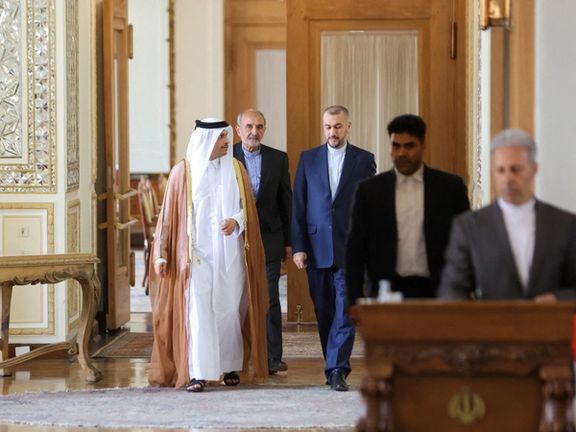
Israel’s Foreign Minister Eli Cohen issued a mild back-handed slap at Qatar’s pro-Hamas policy this week but his message was stymied by a compliment for Doha from Jerusalem’s National Security Adviser.
Cohen said on Tuesday at the UN, “Qatar which finances and harbors Hamas leaders could influence and enable the immediate and unconditional release of the hostages held by the terrorists. You, members of the international community, should demand from Qatar to do just that.”
A day later, National Security Adviser, Tzachi Hanegbi, wrote on X, formerly Twitter that “ I’m pleased to say that Qatar is becoming an essential party and stakeholder in the facilitation of humanitarian solutions. Qatar’s diplomatic efforts are crucial at this time.”
It is unclear if the Israeli government is working at cross purposes or whether Hanegbi is the good cop to Cohen’s bad cop, with a view toward influencing Qatari policy. Qatar’s regime has been unabashedly anti-Israel and pro-Hamas since the Sunni Islamist movement terrorist attack, stating the Jewish state is “solely responsible” for the war.
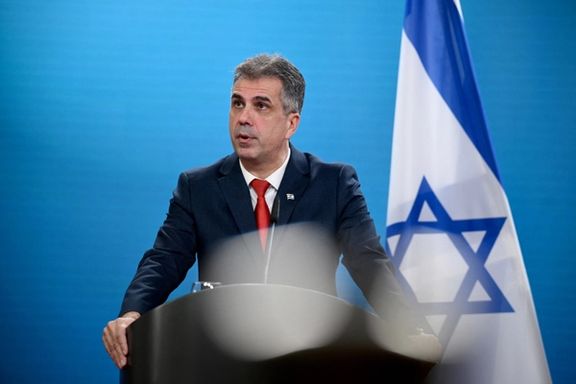
In February, Iran International reported that Cohen said the Islamic Republic of Iran is a “cancer” that finances Hamas and Hezbollah.
Qatar lodges US-terror-designated Hamas and courts the Iranian regime’s foreign minister. Qatar has funded or cultivated good relations with all of Israel’s major enemies from Hamas to Hezbollah to the IRGC.
For many experts on Qatar, which presents itself as global power broker, the Islamist Al Thani family members that rule over the tiny oil-rich Gulf country are the other wing of the same Hamas terrorist bird.
Yigal Carmon, the president and founder of the Middle East Media Research Institute (MEMRI), told Iran International, “Qatar is Hamas and Hamas is Qatar.”
Iran International was the first news organization to report in early September on Carmon’s prescient analysis that a significant terrorism attack would be launched against Israel in September or October.
According to Carmon, the way to secure the release of the over 200 hostages held by the Iran-backed terrorist movement Hamas is to “destabilize Qatar’s economy.”
Carmon, who served as the counter-terrorism adviser to two Israeli prime ministers, added “The elimination of Qatar as an economic base is absolutely necessary. It will happen through private cyber companies. Private companies are realizing that through pressure the hostages will be released. The Qatari economy is a house of cards and they will be destroyed.”
Along those lines, Rabbi Pini Dunner of the Beverly Hills Synagogue, and John Mirisch, a Beverly Hills City Councilmember, to put Qatar in an economic vice are gaining traction via an international campaign to boycott Qatar’s luxury Maybourne hotel in Beverly Hills and its hotel properties in London.
When asked about the international boycott campaign against Qatari-owned hotels, Paula Fitzherbert, global head of communications for the Maybourne in Beverly Hills, Claridge’s, The Connaught, The Berkeley, The Maybourne Riviera, and The Emory, told Iran International: “We won’t be issuing a comment.”
The former colonel in Israel’s military intelligence agency, Carmon, does not mince words. He has studied the supremely opulent Qatari nation for decades. He has also voiced sharp criticism of Israel’s government after Hamas invaded Israel on October 7 and slaughtered over 1,400 people, including many foreigners.
Carmon said” Tragically, our government funneled $1.5 billon” of Qatari funds to Hamas. “This double speak needs to stop. The way to stop is pressure, not begging Qatar.”
Qatar has pumped $1.5 billion into the Hamas-controlled Gaza strip over the last decade. The money, in theory, was designed to aid the population. Israel’s policy doctrine (advocated and implemented by Israeli prime minister Benjamin Netanyahu) that Hamas could be monetarily incentivized to not engage in mass adventurism against the Jewish state is now defunct.
Carmon warned in his 2018 MEMRI article titled “Is Gaza In Need Of Qatar's Aid?'" that Qatar’s aid to Hamas would backfire. He concluded his analysis with the following prediction: "In any event, when Saudi Arabia, the UAE, and Egypt see Israel supporting their enemy Qatar in its bid to expand Doha's influence in Hamas-ruled Gaza, four years after the war, when its economy has not only rebounded but is booming, they can only conclude that Israel is playing a double game – the destructive results of which are bound to come sooner or later."
The US and many Western governments continue to court Qatar and praise its diplomacy. After Qatar helped secure the freedom of two American hostages on October 22, US Secretary of State Antony Blinken told NBC that “I again want to thank the government of Qatar for playing a very important role in getting them out.”
Carmon said “America is protecting Qatar by having its base there.” Qatar hosts the massive Al Udeid Air Base. The MEMRI president argues that the base in Qatar is “endangering the American army” and noted that the Kingdom of Saudi Arabia and the United Arab Emirates offered to move the American military base to their nations.
The growing criticism of Qatar’s dangerous embrace and sponsorship of radical Islamist movements is entering mainstream political and media discourse. Prior to the arrival of Qatar’s emir, Sheikh Tamim bin Hamad Al-Thani, in Berlin just four days after Hamas’ massacre, the German foreign minister Annalena Baerbock urged Qatar to “clearly stand up to this most brutal terror.” The German Free Democratic Party, which is part of the traffic light federal governing coalition, called for Germany’s major gas deal with Qatar to “immediately be put on ice.”
Germany’s largest paper, Bild, headlined its article on the emir’s visit: “Scholz welcomes the top sponsor of terror.” Olaf Scholz is the German Chancellor. The Bild headline would have been largely unimaginable before October 7.
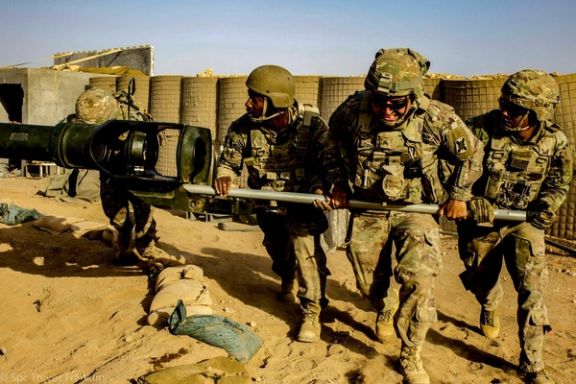
IRGC media report a fresh attack on a US base in Deir Ezzor in Syria on Friday, after US warplanes hit two targets in the region belonging to the Revolutionary Guard.
Tasnim news agency affiliated with the IRGC reported at midday local time that “six missiles launched from the vicinity of Bu Kamal and al-Mayadeen” at the US base near the al-Omar oil fields.
If true, this would constitute a quick response by Iranian forces to a limited US retaliatory attack launched hours earlier at tow reportedly unmanned weapons depots of the Revolutionary Guard near Bu Kamal.
Iran’s armed proxy forces in Syria and Iraq have launched nearly 20 drone and rocket attacks against US bases in the two countries since the October 7 Hamas terror raid into Israel.
President Joe Biden and other US officials had warned of retaliation if Iranian-affiliated forces continued targeting American forces.
Iran had not attacked US bases in the region for nearly a year before the October 7th Hamas invasion. Tehran was holding secret talks with Washington to free billions of dollars of its frozen funds. The Biden administration agreed to release at least $8.7 billion blocked in South Korea and Iraq since June in exchange for five American hostages held by Iran and reportedly an agreement to deescalate tensions. However, the Hamas attack on Israel have led to the possibility of a serious conflict in the region.
Iran fully backs Hamas and has threatened the United States that if the attack on Gaza does not stop, it can engulf US interests.
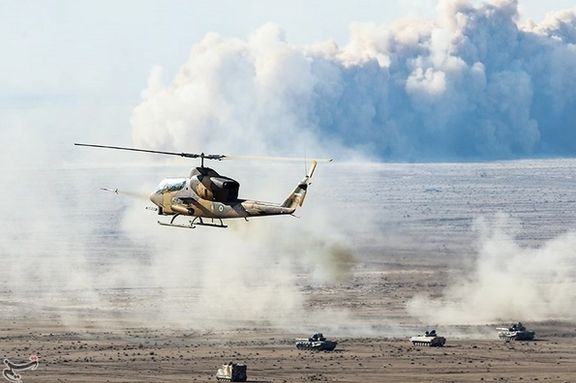
Iranian state media on Friday reported that a two-day military exercise is being carried out in the central Province of Esfahan, amid fears of a wider war in the region.
The ground forces launched a pre-planned drill to test the flight readiness of more than 200 helicopters as tensions in the Middle East rise amid the Hamas-Israel war.
Amir Cheshak, one of the commanders in the military told state media that the exercise aims to test Iran’s response to “possible threats” confronting the country.
Israel and the Islamic Republic are considered as staunch enemies in the region. The rhetoric between the two foes have been more incendiary than usual as the Hamas-Israel war rages on.
Tehran has gone as far as threatening Israel allies if they don’t stop supporting Tel Aviv in the war against Hamas.
Though Cheshak did not elaborate on the details, he told state media that troops and military equipment had been transferred from seven provinces in Iran for the military drill in Nasr Abad region of Esfahan.
The spokesperson said that the drills involve testing various units of the army including missiles, drones, as well as cyber warfare units.
Iran is a supporter of Hams in Gaza and well-armed Hezbollah in Lebanon. The international community has been in fear of the Hamas-Israel war spreading further into the region given Iran’s history of proxy wars.
This week, the Wall Street Journal reported that leading up to the October 7th terrorist attacks by Hamas on Israel, hundreds of the group’s fighters had received combat training in Iran.
The Iranian regime ordered street celebrations as the October 7 attack on Israel was still ongoing and Hamas leaders have thanked Tehran for its military support.
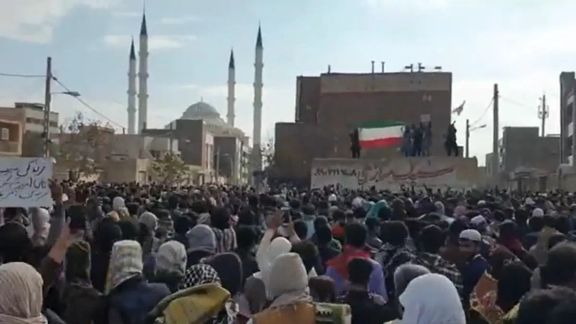
Iranian authorities should stop “the use of unlawful force” against worshippers and demonstrators in the Sunni city of Zahedan, Amnesty International has demanded.
The rights group reported that crackdown on protesters belonging to the Baluchi minority in Zahedan, southwest of Iran, intensified on October 20 as the security forces “resorted to severe beatings, unlawful use of tear gas and water cannons” and “carried out mass arbitrary arrests, enforced disappearances, torture and other ill-treatment.”
According to Amnesty, hundreds of people, including “scores of children” were arrested last week, with many of them still remaining “forcibly disappeared.”
The report also mentioned that many of the arrested individuals, even children, were tortured by security forces.
“Security forces removed detainees’ shirts and made them stand facing the wall while blindfolded before firing paintball launchers at their backs and hips at close range,” read the report by Amnesty International.
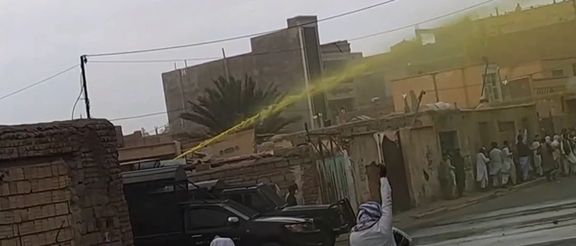
The people of Sistan-Baluchestan, with Zahedan as provincial capital, have been holding weekly protests after security forces opened fire at peaceful protesters, killing nearly 100 on September 30, 2022, a day known as the Bloody Friday of Zahedan.
Zahedan is one of the few Sunni-majority cities in predominantly Shiite Iran.
“The authorities are ramping up their brutality to stop Baluchi protesters from gathering each week in Zahedan,” warned Diana Eltahawy, Amnesty International’s Deputy Regional Director for the Middle East and North Africa.
She also called on the international community to urge Iran “to halt the unlawful use of force and firearms against peaceful protesters, stop torturing detainees and release children and all others detained solely for peacefully exercising their rights.”
According to Eltahawy, the systematic impunity of the Iranian officials has allowed them to impose more severe crackdowns on the protesters.
It is essential that criminal investigations be launched into the crimes committed by the Iranian officials “under the principle of universal jurisdiction,” she stressed.
A witness to the October 20 violence told Amnesty International that security forces abandoned a wounded child in the streets even though he had a bleeding gash.
“Many detainees including children sustained fractures to their hands and legs,” the witnessed added.
Another woman also called on the organization to “ensure the voices of Baluchi protesters are heard,” warning that every Friday in the region might witness another heinous bloodshed.
According to reports, on October 20, security was tense around the Makki Jameh Mosque of Zahedan, where outspoken Sunni leader Mowlavi Abdolhamid weekly delivers fiery sermons criticizing the Islamic Republic and its policies.
Abdolhamid has repeatedly called for an end to repression in the past one year and respect for civic and human rights in Iran.
The heavy security atmosphere on October 20 can be related to a wave of crackdowns against the Sunni community, particularly dissident Sunni clerics and their close circles, including arrests and travel bans, especially since the Israel-Hamas conflict began earlier in the month.
Amnesty International also called on the international community to press Tehran to cooperate with the United Nations Fact-Finding Mission and provide it with “unimpeded access.”
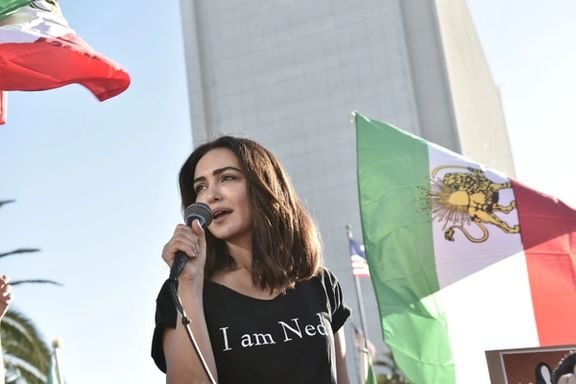
Iranian-born actress and political activist Nazanin Boniadi has criticized the international community for showing leniency towards the Islamic Republic on numerous occasions.
Boniadi is a prominent voice amongst the opposition and has been critical of the United States (US) and European countries for allowing Iranian authorities to use international platforms for spreading propaganda and furthering their malign activities in the region.
Iran’s foreign Hossein Amir-Abdollahian spoke at the United Nations General Assembly meeting on Thursday about brokering a deal regarding the release of the hostages who are being held by Hamas.
Iran’s foreign minister said Hamas is ready to release hostages to the Islamic Republic, and he said the international community must take responsibility for releasing 6,000 Palestinian prisoners held in Israel.
In a post on X, Boniadi went on to criticize the fact that Iran’s foreign minister has been given a platform to talk about hostages when Iran is a well-known practitioner of the hostage-taking crime.
“The international community has incentivized hostage diplomacy and the Islamic Republic and its proxies will continue to use this heinous crime to achieve their political goals as long as the world lets them,” said Boniadi.
In September, the US and Iran made a deal through which five Iranian- American hostages kept in Iran were released in exchange of $6 billion of frozen assets now held in Qatar. The agreement received wide condemnation from US lawmakers and Iranian opposition figures including the former Crown Prince of Iran, Reza Pahlavi.
“Unfortunately, the billions of dollars that the Biden administration will reportedly release to the regime as ransom for five hostages will not reduce the suffering of my countrymen,” said Pahlavi on X.